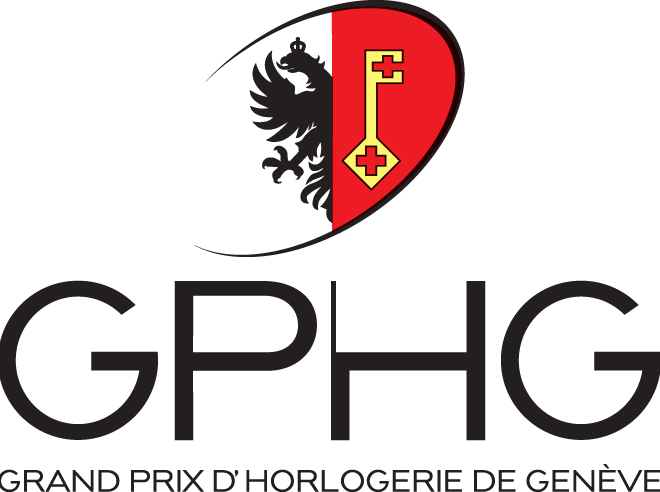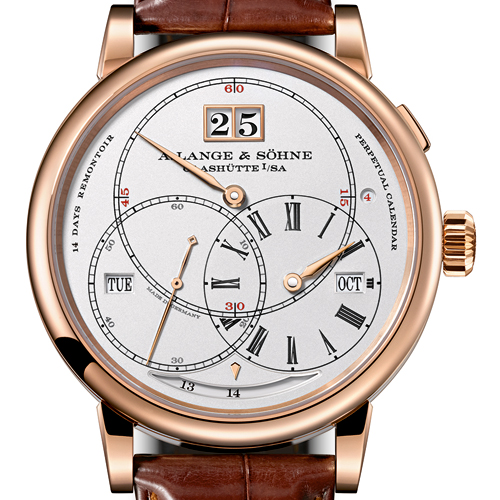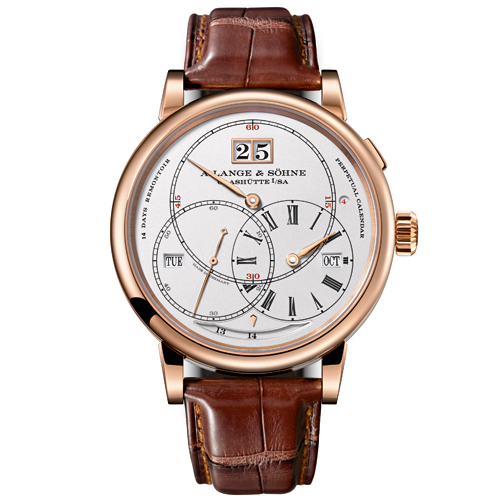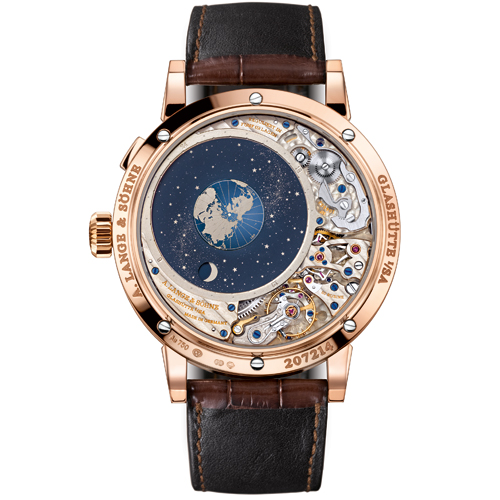
Richard Lange Perpetual Calendar "Terraluna"
Power reserve: 336 h, 21600 vph
RICHARD LANGE PERPETUAL CALENDAR “Terraluna”
Regulator with orbital moon-phase display and 14-day movement
The RICHARD LANGE PERPETUAL CALENDAR “Terraluna” is a horological masterpiece that combines A. Lange & Söhne’s benchmark precision, inventiveness, and design competence. Featuring an orbital moon-phase display, a perpetual calendar with the Lange outsize date, a power-reserve of 14 days, and a constant-force escape- ment, this extraordinary time-keeping instrument represents the pinnacle of Saxon watchmaking artistry.
The RICHARD LANGE PERPETUAL CALENDAR “Terraluna” is equally impressive on both sides. On the dial side of the 45.5-millimetre pink- or white-gold case, the watch stands out with the regulator layout of scientific precision watches. The movement side presents an innovative and useful orbital moon-phase display that depicts the constellation of the earth, moon, and sun.
Three circles for time
The large minute circle is at the top of the dial of the RICHARD LANGE PERPETUAL CALENDAR “Terraluna”. The smaller dials for the hours and seconds are beneath it, shifted toward the right and left. As was already the case with the RICHARD LANGE TOURBILLON “Pour le Mérite” presented in 2011, this dial design was inspired by a great historic role model: Johann Heinrich Seyffert’s 1807 regulator from the world-famous timepiece collection of the Mathematics and Physics Salon. With his ingenious designs, Seyffert helped transform Dresden into a hub of precision horology in the early 19th century. A great advantage in precision pocket watches, the regulator format was appreciated not only by time-keeping services and observatories, but also by watchmaking manufactories where it was used for synchronising new timepieces. This is because it provided an accurate display of the minutes and seconds.
Four windows for eternity
Beneath the characteristic Lange outsize date – the first one in a model of the RICHARD LANGE watch family, incidentally – two smaller apertures show the dayof the week on the left and the month on the right. Thanks to this arrangement,the calendar displays can be easily read at a glance. The calendar is mechanically programmed to correctly display the different durations of the months in a year as well as those in leap years until 2100. The leap-year indication is located in a small round window on the right-hand side of the 15 of the minute circle. All displays of the calendar switch forward instantaneously to assure unambiguous readings at all times. To keep the power for the switching process as low as possible, the required energy is gradually built up via a cam and then released abruptly at midnight.
The moon on its orbit
An exciting technical innovation can be seen on the movement side: there, the patent- pending orbital moon-phase display shows the location of the moon relative to the earth and the sun – for the first time ever in a wristwatch. The display consists of three discs. On the star-studded celestial disc, the moon – visible through a round aperture – orbits around the earth anti-clockwise once a month. The mechanism reproduces the synodic month of 29 days, 12 hours, 44 minutes, and 3 seconds so precisely that it takes 1058 years before the display needs to be corrected by one day. Beneath it, the lunar disc rotates, featuring two round new moons. The progression of the moon phases can be observed through the aperture in the celestial disc. In the constellation view, the position of the sun is occupied by the balance. On new-moon days, the dark moon stands between the earth and the sun. It appears as a bright sphere on the opposite side of the earth on full-moon days. Thus, the position and phase of the moon are indicated simultaneously. In the centre of the display, the earth rotates about its own axis once a day. It is daytime on the half that faces the sun, or the balance, and night-time on the other. The peripheral 24- hour scale provides a time-of-day reference for the northern hemisphere.
The ambitious precision goals of Lange’s product developers come to the fore not only in the configuration of the moon-phase display mechanism, which consists of three solid white-gold discs, but also in its design. To achieve a vivid and aesthetically sophisticated image of the orbiting moon-phase display, they chose a special coating process. On the celestial disc, for example, interference effects absorb all of the non-blue colour spectra of the incident light. The result is a deep-blue surface studded with more than a thousand high-contrast, sharply contoured stars.
Constant force for two weeks
With two rugged mainsprings, the twin barrel delivers a power reserve of 14 days. When a spring barrel stores so much energy, special technical precautions must be taken to keep the rate of the watch stable during the entire power-reserve period. The torque of the fully wound spring would be too high to be delivered directly to the going train. And as its torque declines when it approaches the unwound state, the accuracy of the watch would deteriorate. An elaborate constant-force escapement compensates for both phe- nomena. In ten-second intervals, it releases an identical portion of the available energy to the balance, thus assuring that the torque remains constant. The result is an unvarying amplitude and high rate accuracy from the first day to the last. At the 6-o’clock position, a power-reserve indicator in the form of a circumferential ring tells the owner when the time has come to replenish the movement with fresh energy via the winding crown.



